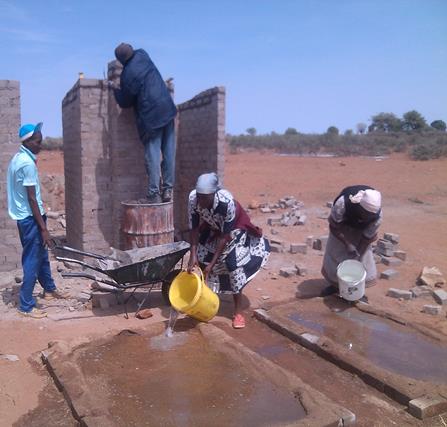Investigating the factors affecting Community-Led Total Sanitation in Liberia and Sierra Leone
19/07/2016

This summer, I will be going home to Africa to help improve the lives of those living in Liberia and Sierra Leone.
As a native Zimbabwean and the recipient of a Commonwealth Scholarship at Cranfield, it’s great that my MSc in Community Water and Sanitation includes the offer of an overseas placement. I’m delighted to have been given the opportunity to visit another part of Africa and I’m grateful to the University for arranging this chance to develop and learn with WaterAid (an international charity that transforms lives by improving access to safe water, hygiene and sanitation).
Community-Led Total Sanitation (CLTS) is an innovative approach for mobilising communities to completely eliminate open defecation, facilitate communities to conduct their own appraisal and analysis of open defecation, and take their own action to become open defecation free.
The approach was recommended by UNICEF as a sanitation coverage strategy towards achieving the United Nations’ Millennium Development Goals (MDGs), now replaced by the Sustainable Development Goals (SDGs) from 2016 onwards.
Since its introduction in Liberia and Sierra Leone in 2009, there has been widespread acceptability of the concept by communities and governments. This includes self-replication of the concept in communities, as more became open defecation free without being triggered by any agency.
However, following successful implementation of the CLTS approach, concerns have been raised about some communities reverting from the open defecation free status.
This has led me to investigate the factors affecting the sustainability of CLTS, focused on these two countries in West Africa. The primary aim is to find out why some CLTS programmes in Liberia and Sierra Leone succeed in realising sustainable open defecation free status, while others fail to do so.
I’m wanting to understand the ambition, implementation plans and associated performance targets of CLTS initiatives; identify and compare the challenges of CLTS roll-out in communities where open defecation free status was achieved and not achieved; identify features of CLTS implementation associated with non-open defecation free compliance; and to design a ‘roadmap’ to strengthen the sustainability of CLTS initiatives.
My study will be qualitative and ethnographic as sustainability of the CLTS approach is dependent on community behaviours, how they organise themselves and their response to external interventions. It will also take a comparative approach, as I seek to expose both inconsistencies between ideal and real CLTS implementation, and weaknesses in the link between implemented actions and impact, allowing a comparable evaluation of the determinants of relative success and failure.
In each of the two countries, two districts or counties will be purposely selected, based on the reports of relapse of CLTS and open defecation free achievement. Two communities will be selected from each district – one that achieved open defection free status and relapsed; and a non-open defecation free community.
My research will use document identification and retrieval; conduct in-depth interviews with the heads of government departments, community leaders, and other non-governmental organisations; take focus groups; and make home visits to observe. I will record all these communications and then transcribe them, taking note of key themes and statements, with this data hopefully providing clues to the various factors influencing CLTS sustainability.
I look forward to gaining some experience in social research at international level and understanding the basic principles of consultancy in WASH (Water, Sanitation and Hygiene)-related assignments. It is also an opportunity for me to know more about other cultures and learn new languages in the African coastal regions.
Ncomulwazi Khumalo, MSc in Community Water and Sanitation
Categories & Tags:
Leave a comment on this post:
You might also like…
Company codes – CUSIP, SEDOL, ISIN…. What do they mean and how can you use them in our Library resources?
As you use our many finance resources, you will probably notice unique company identifiers which may be codes or symbols. It is worth spending some time getting to know what these are and which resources ...
Supporting careers in defence through specialist education
As a materials engineer by background, I have always been drawn to fields where technical expertise directly shapes real‑world outcomes. Few sectors exemplify this better than defence. Engineering careers in defence sit at the ...
What being a woman in STEM means to me
STEM is both a way of thinking and a practical toolkit. It sharpens reasoning and equips us to turn ideas into solutions with measurable impact. For me, STEM has never been only about acquiring ...
A woman’s experience in environmental science within defence
When I stepped into the gates of the Defence Academy it was the 30th September 2019. I did not know at the time that this would be the beginning of a long journey as ...
Working on your group project? We can help!
When undertaking a group project, typically you'll need to investigate a topic, decide on a methodology for your investigation, gather and collate information and data, share your findings with each other, and then formally report ...
From passion to purpose: My journey at the Pinnacle of Aviation
By: Sultana Yassin Abdi MSc Air Transport Management, Current Student Born and raised in the vibrant landscape of the UAE, with roots stretching back to Somalia, my life has always been ...






